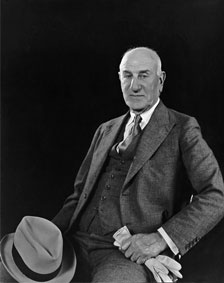
|
 |

Solomon R. Guggenheim was born in Philadelphia in 1861 to a mercantile family, which later made its wealth in the mining industry. Along with his wife, Irene Rothschild, he earned a reputation as a patron of the arts and philanthropist.
Starting in the mid-1890s, Guggenheim began collecting old masters, American landscapes, the French Barbizon School, and primitive art. The nature of his collection, however, changed radically in 1927, when he met Hilla Rebay (1890–1967), who introduced him to the work of the European avant-garde. In July 1930 Rebay organized a meeting between Guggenheim and Vasily Kandinsky, whose work Guggenheim would buy in depth for his collection. Starting in 1930, the public was allowed to view Guggenheim's collection in his private apartment at the Plaza Hotel in New York. Soon the walls were covered with paintings by such artists as Rudolf Bauer, Marc Chagall, Fernand Léger, and László Moholy-Nagy.
In 1937 Guggenheim established the Solomon R. Guggenheim Foundation in 1937. This step led to the opening in 1939 of the Museum of Non-Objective Painting on East Fifty-fourth Street and then in 1947 to the museum's next temporary location in a townhouse at 1071 Fifth Avenue, as well as to the commissioning in 1943 of Frank Lloyd Wright to design a new building to house the collection. Guggenheim died in 1949 ten years before the completion of the museum that commemorates his name.
Solomon R. Guggenheim. Solomon R. Guggenheim Museum Archives, New York
|
 |
|
|



